人教版英语九年级全册 Unit 4 I used to be afraid of the dark. 讲义(知识梳理和练习)
文档属性
| 名称 | 人教版英语九年级全册 Unit 4 I used to be afraid of the dark. 讲义(知识梳理和练习) | 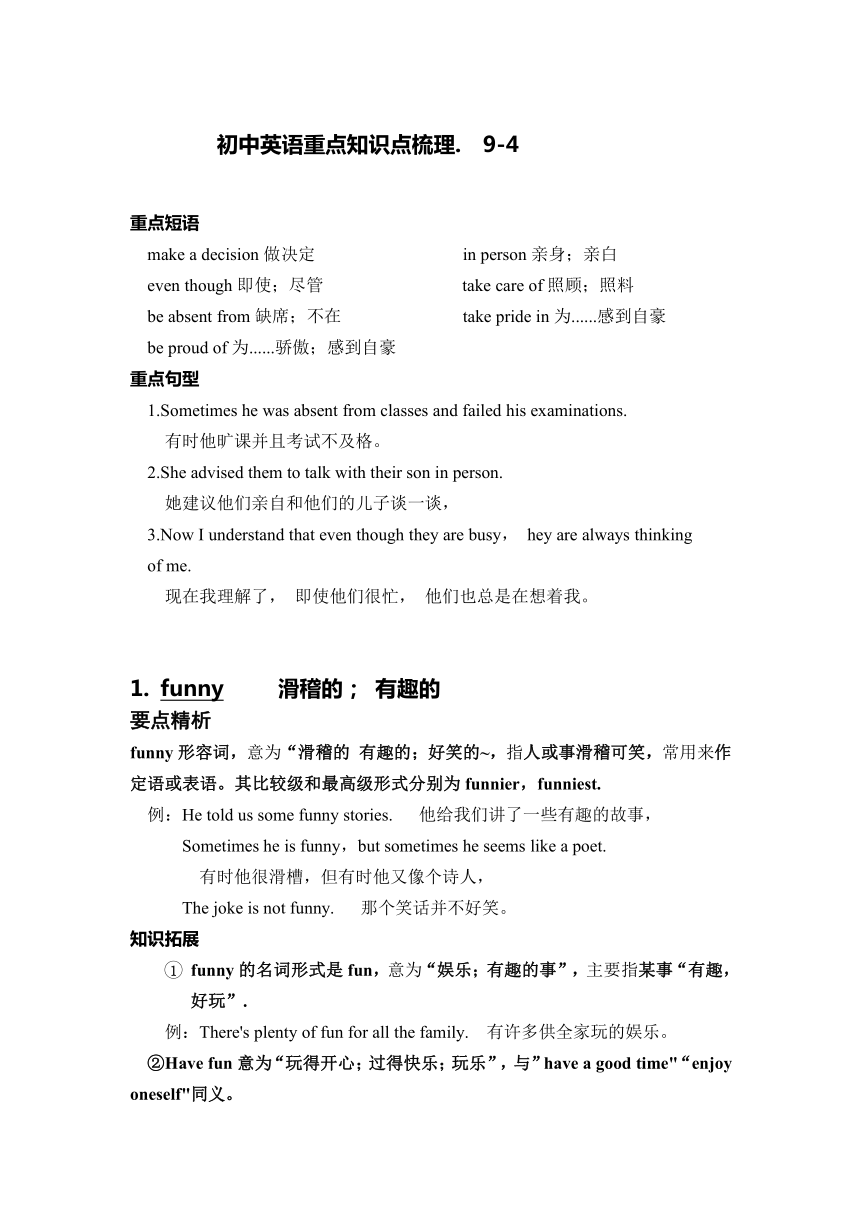 | |
| 格式 | docx | ||
| 文件大小 | 48.0KB | ||
| 资源类型 | 教案 | ||
| 版本资源 | 人教新目标(Go for it)版 | ||
| 科目 | 英语 | ||
| 更新时间 | 2021-08-24 15:46:51 | ||
图片预览

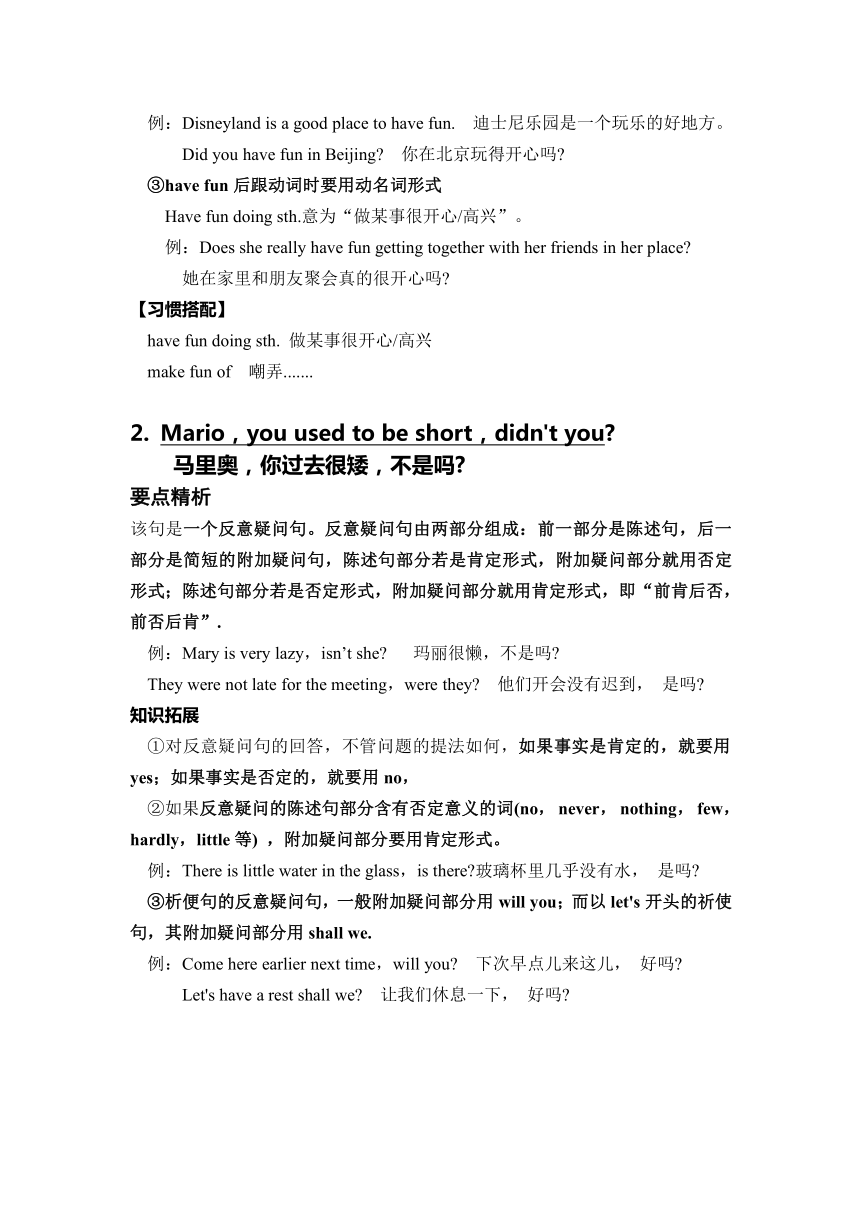
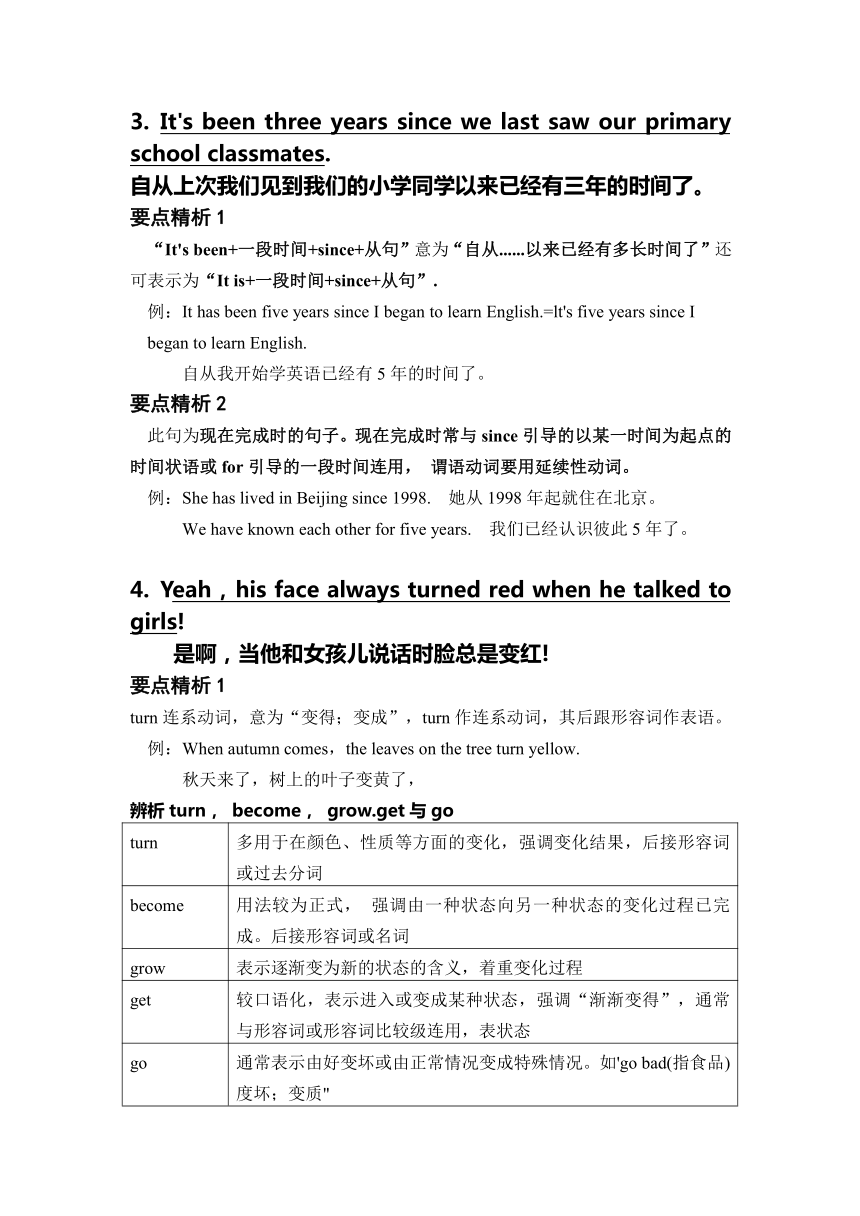
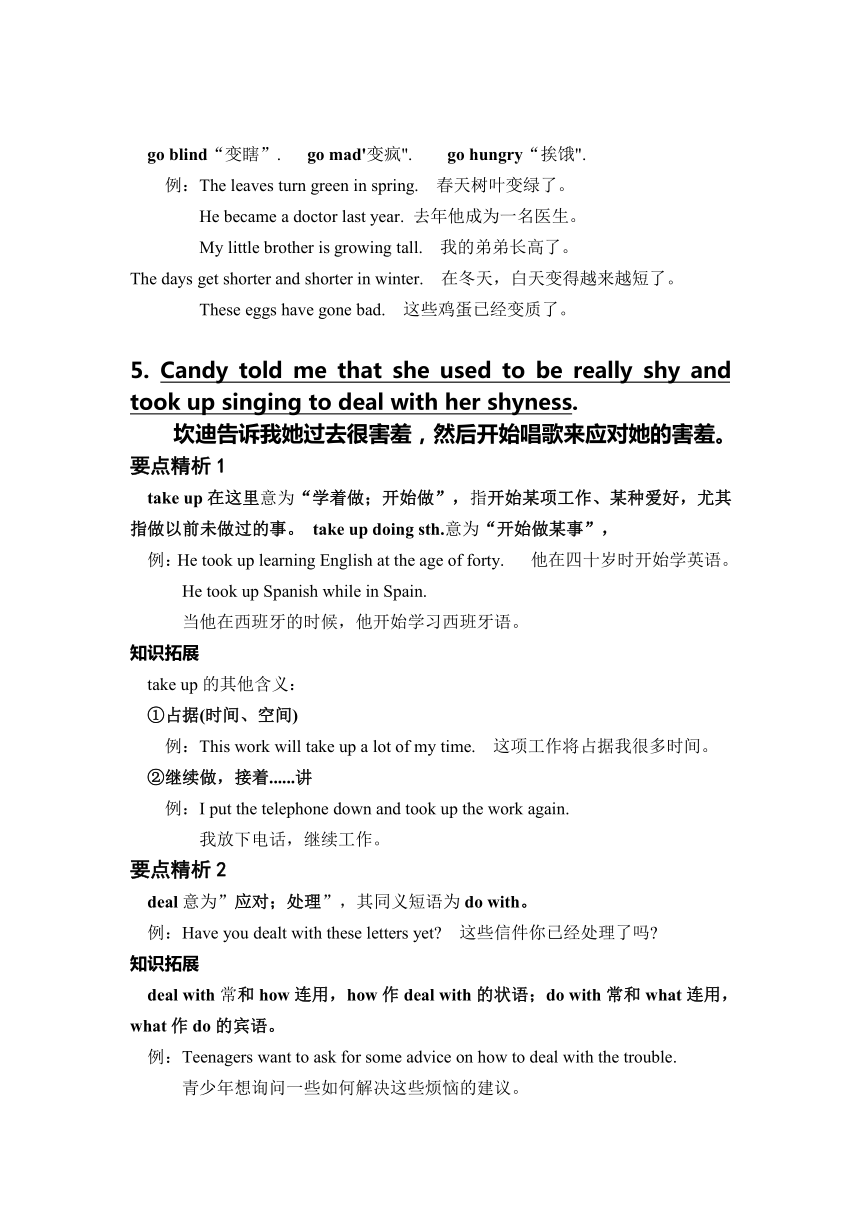
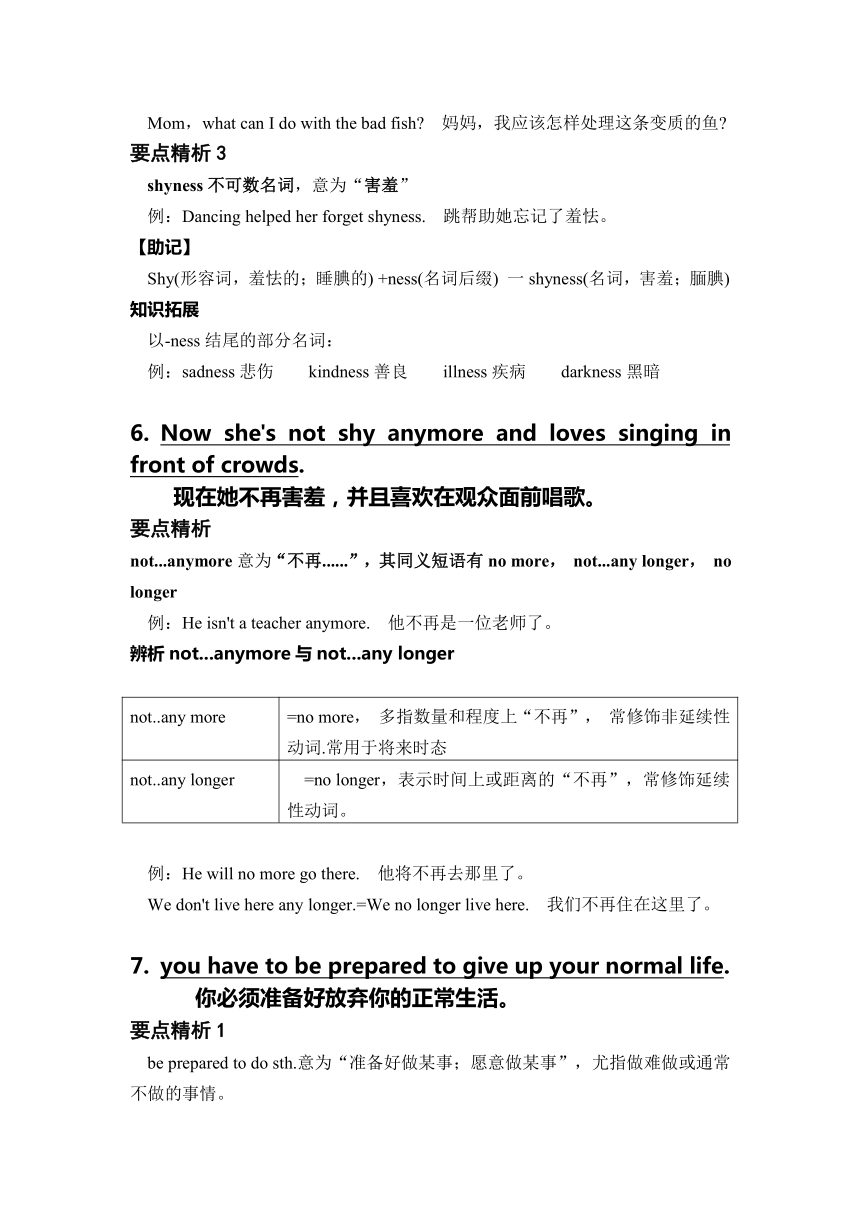
文档简介
初中英语重点知识点梳理.
9-4
重点短语
make
a
decision做决定
in
person亲身;亲白
even
though即使;尽管
take
care
of照顾;照料
be
absent
from缺席;不在
take
pride
in为......感到自豪
be
proud
of为......骄傲;感到自豪
重点句型
1.Sometimes
he
was
absent
from
classes
and
failed
his
examinations.
有时他旷课并且考试不及格。
2.She
advised
them
to
talk
with
their
son
in
person.
她建议他们亲自和他们的儿子谈一谈,
3.Now
I
understand
that
even
though
they
are
busy,
hey
are
always
thinking
of
me.
现在我理解了,
即使他们很忙,
他们也总是在想着我。
funny
滑稽的;
有趣的
要点精析
funny形容词,意为“滑稽的
有趣的;好笑的~,指人或事滑稽可笑,常用来作定语或表语。其比较级和最高级形式分别为funnier,funniest.
例:He
told
us
some
funny
stories.
他给我们讲了一些有趣的故事,
Sometimes
he
is
funny,but
sometimes
he
seems
like
a
poet.
有时他很滑槽,但有时他又像个诗人,
The
joke
is
not
funny.
那个笑话并不好笑。
知识拓展
funny的名词形式是fun,意为“娱乐;有趣的事”,主要指某事“有趣,
好玩”.
例:There's
plenty
of
fun
for
all
the
family.
有许多供全家玩的娱乐。
②Have
fun意为“玩得开心;过得快乐;玩乐”,与”have
a
good
time"“enjoy
oneself"同义。
例:Disneyland
is
a
good
place
to
have
fun.
迪士尼乐园是一个玩乐的好地方。
Did
you
have
fun
in
Beijing?
你在北京玩得开心吗?
③have
fun后跟动词时要用动名词形式
Have
fun
doing
sth.意为“做某事很开心/高兴”。
例:Does
she
really
have
fun
getting
together
with
her
friends
in
her
place?
她在家里和朋友聚会真的很开心吗?
【习惯搭配】
have
fun
doing
sth.
做某事很开心/高兴
make
fun
of
嘲弄.......
Mario,you
used
to
be
short,didn't
you?
马里奥,你过去很矮,不是吗?
要点精析
该句是一个反意疑问句。反意疑问句由两部分组成:前一部分是陈述句,后一部分是简短的附加疑问句,陈述句部分若是肯定形式,附加疑问部分就用否定形式;陈述句部分若是否定形式,附加疑问部分就用肯定形式,即“前肯后否,前否后肯”.
例:Mary
is
very
lazy,isn’t
she?
玛丽很懒,不是吗?
They
were
not
late
for
the
meeting,were
they?
他们开会没有迟到,
是吗?
知识拓展
①对反意疑问句的回答,不管问题的提法如何,如果事实是肯定的,就要用yes;如果事实是否定的,就要用no,
②如果反意疑问的陈述句部分含有否定意义的词(no,
never,
nothing,
few,
hardly,little等)
,附加疑问部分要用肯定形式。
例:There
is
little
water
in
the
glass,is
there?玻璃杯里几乎没有水,
是吗?
③析便句的反意疑问句,一般附加疑问部分用will
you;而以let's开头的祈使句,其附加疑问部分用shall
we.
例:Come
here
earlier
next
time,will
you?
下次早点儿来这儿,
好吗?
Let's
have
a
rest
shall
we?
让我们休息一下,
好吗?
It's
been
three
years
since
we
last
saw
our
primary
school
classmates.
自从上次我们见到我们的小学同学以来已经有三年的时间了。
要点精析1
“It's
been+一段时间+since+从句”意为“自从......以来已经有多长时间了”还可表示为“It
is+一段时间+since+从句”.
例:It
has
been
five
years
since
I
began
to
learn
English.=lt's
five
years
since
I
began
to
learn
English.
自从我开始学英语已经有5年的时间了。
要点精析2
此句为现在完成时的句子。现在完成时常与since引导的以某一时间为起点的时间状语或for引导的一段时间连用,
谓语动词要用延续性动词。
例:She
has
lived
in
Beijing
since
1998.
她从1998年起就住在北京。
We
have
known
each
other
for
five
years.
我们已经认识彼此5年了。
Yeah,his
face
always
turned
red
when
he
talked
to
girls!
是啊,当他和女孩儿说话时脸总是变红!
要点精析1
turn连系动词,意为“变得;变成”,turn作连系动词,其后跟形容词作表语。
例:When
autumn
comes,the
leaves
on
the
tree
turn
yellow.
秋天来了,树上的叶子变黄了,
辨析turn,
become,
grow.get与go
turn
多用于在颜色、性质等方面的变化,强调变化结果,后接形容词或过去分词
become
用法较为正式,
强调由一种状态向另一种状态的变化过程已完成。后接形容词或名词
grow
表示逐渐变为新的状态的含义,着重变化过程
get
较口语化,表示进入或变成某种状态,强调“渐渐变得”,通常与形容词或形容词比较级连用,表状态
go
通常表示由好变坏或由正常情况变成特殊情况。如'go
bad(指食品)
度坏;变质"
go
blind“变瞎”.
go
mad'变疯".
go
hungry“挨饿".
例:The
leaves
turn
green
in
spring.
春天树叶变绿了。
He
became
a
doctor
last
year.
去年他成为一名医生。
My
little
brother
is
growing
tall.
我的弟弟长高了。
The
days
get
shorter
and
shorter
in
winter.
在冬天,白天变得越来越短了。
These
eggs
have
gone
bad.
这些鸡蛋已经变质了。
Candy
told
me
that
she
used
to
be
really
shy
and
took
up
singing
to
deal
with
her
shyness.
坎迪告诉我她过去很害羞,然后开始唱歌来应对她的害羞。
要点精析1
take
up在这里意为“学着做;开始做”,指开始某项工作、某种爱好,尤其指做以前未做过的事。
take
up
doing
sth.意为“开始做某事”,
例:He
took
up
learning
English
at
the
age
of
forty.
他在四十岁时开始学英语。
He
took
up
Spanish
while
in
Spain.
当他在西班牙的时候,他开始学习西班牙语。
知识拓展
take
up的其他含义:
①占据(时间、空间)
例:This
work
will
take
up
a
lot
of
my
time.
这项工作将占据我很多时间。
②继续做,接着......讲
例:I
put
the
telephone
down
and
took
up
the
work
again.
我放下电话,继续工作。
要点精析2
deal意为”应对;处理”,其同义短语为do
with。
例:Have
you
dealt
with
these
letters
yet?
这些信件你已经处理了吗?
知识拓展
deal
with常和how连用,how作deal
with的状语;do
with常和what连用,what作do的宾语。
例:Teenagers
want
to
ask
for
some
advice
on
how
to
deal
with
the
trouble.
青少年想询问一些如何解决这些烦恼的建议。
Mom,what
can
I
do
with
the
bad
fish?
妈妈,我应该怎样处理这条变质的鱼?
要点精析3
shyness不可数名词,意为“害羞”
例:Dancing
helped
her
forget
shyness.
跳帮助她忘记了羞怯。
【助记】
Shy(形容词,羞怯的;睡腆的)
+ness(名词后缀)
一shyness(名词,害羞;腼腆)
知识拓展
以-ness结尾的部分名词:
例:sadness悲伤
kindness善良
illness疾病
darkness黑暗
Now
she's
not
shy
anymore
and
loves
singing
in
front
of
crowds.
现在她不再害羞,并且喜欢在观众面前唱歌。
要点精析
not...anymore意为“不再......”,其同义短语有no
more,
not...any
longer,
no
longer
例:He
isn't
a
teacher
anymore.
他不再是一位老师了。
辨析not...anymore与not...any
longer
not..any
more
=no
more,
多指数量和程度上“不再”,
常修饰非延续性动词.常用于将来时态
not..any
longer
=no
longer,表示时间上或距离的“不再”,常修饰延续性动词。
例:He
will
no
more
go
there.
他将不再去那里了。
We
don't
live
here
any
longer.=We
no
longer
live
here.
我们不再住在这里了。
you
have
to
be
prepared
to
give
up
your
normal
life.
你必须准备好放弃你的正常生活。
要点精析1
be
prepared
to
do
sth.意为“准备好做某事;愿意做某事”,尤指做难做或通常不做的事情。
例:Are
you
prepared
to
give
up
freedom?
你愿意放弃自由吗?
知识拓展
be
prepared
for
sth.意为“为某事做好准备".
例:I’m
prepared
for
the
exam.
我为考试做好了准备。
要点精析2
give
up意为“放弃”,其后接名词、代词或动名词作宾语.give
up是“动词+副词”型短语,后接代词作宾语时,
代词应置于give与up之间.give
up
doing
sth.意为“放弃做某事”。
例:I
can't
answer
that
puzzle.I
give
it
up.
我猜不出那个谜语,我放弃它了。
Don’t
give
up
studying
English.
不要放弃学习英语。
Only
a
very
small
number
of
people
make
it
to
the
top.
只有很少的人能攀上成功之。
要点精析l
a
very
small
number意为“极少数”,后接复数名词.A
number
of意为“许多的”,相当于a
lot
of,起修饰作用,“a
number
of+可数名词复数”作主语时,
谓语动词要用复数形式。
例:There
area
number
of
ants
on
the
ground.
地上有很多蚂蚁。
知识拓展
the
number
of...意为“......的数量”,作主语时,谓语动词用单数形式.
例:The
number
of
visitors
to
France
has
now
increased
去法国的游客数量现在已经增加了。
The
number
of
the
apples
is
40.
这些苹果的数量是四十。
giving
a
speech
in
public
当众做演讲。
要点精析1
give
a
speech意为“做演讲”,相当于make
a
speech.speech为可数名词,意为“讲话;发言“.
例:They
invited
her
to
give
a
speech.
他们邀请她做演讲。
要点精析2
in
public意为“当众,在公共场合”.
例:It
is
not
polite
to
stare
at
others
in
public.
在公共场合盯着别人看是不礼貌的。
His
parents
moved
to
the
city
to
look
for
jobs
and
his
grandparents
came
to
take
care
of
him.
他的父母搬到城市去找工作,他的祖父母来照顾他。
要点精析
take
care
of意为“照颖照料”同义短语为look
after“好好照顾“可用take
good
care
of或look
after...well表示。
例:Who's
taking
care
of
the
child
while
you're
away?
你外出时谁来照料这个孩子?
知识拓层
take
care意为“当心;小心”,与be
careful,lookout同义,常用于析使句或警告对方时的用语。take
care
that/
to
do
sth.“小心,当心....../做某事”。
例:Take
care
that
you
don't
drink
too
much!
你当心别喝得太多!
Take
care
not
to
break
the
glass.
小心别打碎玻璃杯。
Be
careful
not
to
lose
the
key.
当心不要丢了钥匙。
Look
out!There's
danger
ahead.
当心!前面有危险。
Sometimes
he
was
absent
from
classes
and
failed
his
examinations.
有时他旷课井且考试不及格。
要点精析l
absent形容词,意为“缺席的;不在场的”,常与介词from连用
例:They
were
absent
from
work
that
day.
他们那天没有上班。
知识拓展
①意为“缺席;不在”。
例:The
decision
was
made
in
my
absence
这个决定是我absence名词不在的时候做出的。
②absent的反义词为present,
意为“出席的;
到场的".
例:Many
famous
writers
are
present
at
the
meeting
许多著名作家都出席了这次会议点。
要点精析2
fail此处用作及物动词,
意为“不及格;
未通过”,
也可用作不及物动词,
因此fail
examination(考试不及格)
也可表示为fail
in
an
examination.
例:Bob
always
fails(in)
his
examinations.
鲍勃总是考试不及格。
知识拓展
fail作动词,还可意为“失败;未能(做到)
”.常用于搭配fail
to
do
sth.“做某事失败;未能做成某事”.
例:Doctors
failed
to
save
the
girl's
life.
医生们没能救活这个女孩儿。
要点精析3
examination可数名词,意为”考试”相当于exam,但比较正式。其动词形式为examine.
例:Everyone
is
waiting
for
the
examination
results.
每个人都在等待考试成绩。
小贴士
表示“参加考试",要用take
an
examination
exam,表示“通过考试”,要用pass
the
examination/exam.
She
advised
them
to
talk
with
their
son
in
person.
她建议他们亲自和他们的儿子谈一谈。
要点精析1
advice动词,意为“向......提出意见/忠告/建议”。advice意为“建议”,是不可数名词.
例:Could
you
advise
me
on
the
problem?I
really
need
some
advice
about
it.
关于这个问题你能给我些建议吗?我真的需要一些关于它的建议。
知识拓展
advise常用于下列结构:
①advise+doing
例:I’d
advise
buying
your
tickets
in
advance.
我建议你提前订票。
②advises
b.(not)
to
do
sth
例:I
advise
you
to
be
cautious.
我建议你要小心谨慎,
I
advise
you
not
to
tell
him.
我建议你不要告诉他,
③advise+定语+介词
例:The
doctor
can
advise
you
on
health.
医生能就你的健康提一些建议。
要点精析2
in
person意为“亲身;亲自”,相当于by
oneself,在句中作状语。
例:You
had
better
come
in
person
and
say
sorry
to
her.
你最好亲自过来并向她道.
知识拓展
in
person在很多情况下相当于by
oneself,
例:Do
you
need
to
do
it
in
person/by
yourself?
你需要亲自做这件事吗?
You
may
get
the
form
in
person
or
by
letter.
你可以亲自来领取表格或通过信件(获得)。
It
was
exactly
what
I
needed...这正是我所需要的......
要点精析1
exactly副词,意为”确切地;精确地”,单独使用表示“赞同”,意为“确实;
如此”.
例:That's
exactly
what
I
want
to
buy.
那正是我想买的。
Tell
me
exactly
where
he
is.
确切地告诉我他在哪里。
-So
you
think
that
we
should
spend
more
money
on
education?
所以你就认为我们应该在教育上多花些钱?
-Exactly.
确实如此,
要点精析2
what引导的句子在句中作表语,叫作表语从句,表语从句由引导词引导,引导词的选用由句意决定.
例:China
is
no
longer
what
it
was
thirty
years
ago.
中国不再是30年前的样子了。
Now
I
understand
that
even
though
they
are
busy,
they
are
always
thinking
of
me.
现在我理解了,即使他们很忙,他们也总是在想着我.
要点精析1
这是一个复合句,that引导的是宾语从句,该宾语从句中又含有一个由even
though引导的让步状语从句。
要点精析2
Even
though相当于even
if,表示“即使;尽管”,引导让步状语从句,
例:Even
though
you
take
a
taxi
you
will
miss
the
train
即使你乘坐出租车,你也将赶不上火车了。
要点精析3
be
always
doing
sth.意为“总是做某事”,常用于表达说话人的某种情结,如赞扬、不满、责备等。
例:He
was
always
asking
his
parents
for
money.
他总是向他父母要钱。
She
is
always
thinking
of
her
parents.
她总是想着她的父母。
They
take
pride
in
everything
good
that
I
do.
他们为我做的每一件好事感到自豪。
要点精析1
take
pride
in意为“为......感到自豪”常用于因取得某种成绩或荣誉而感到自豪。
例:His
father
takes
great
pride
in
what
he
has
done.
他父亲对他做的事情感到非常自豪。
要点精析2
everything
good意为“每一件好事“。形容词good在这里作定语,修饰前面的不定代词everything,形容词作定语修饰something,anything,nothing,everything等不定代词时,形容词要放在这些不定代词的后面。
例:Here
isn't
anything
Interesting
in
today's
newspaper.
今天的报纸上没有任何有趣的东西。
I
have
something
important
to
tell
you.
我有一些重要的事情要告诉你。
There
is
nothing
new
in
his
house.
他家里没有什么新的东西,
I
know
my
parents
love
me
and
they're
always
proud
of
me...
我知道我的父母爱我井且他们总是为我感到骄傲......
要点精析1
be
proud
of意为“以......为骄傲;感到自豪”与take
pride
in同义,但be
proud
of通常用于因为某人而感到骄傲与自豪.
例:They
are
very
proud
of
their
son.
他们为他们的儿子感到非常骄傲。
知识拓展
proud是形容词,意为“自宗的;骄傲的”其名词形式是pride,意为“自豪,
骄傲”以proud构成的词组是be
proud
of;以pride构成的词组是take
pride
in.
What
do
you
think
Li
Wen
and
his
parents
talked
about
in
their
conversation?
你认为李文和他的父母在他们的谈话中谈了什么?
要点精析1
conversation名词,意为“谈话;
交谈”,
例:You
may
have
a
telephone
conversation
with
her.
你可以与她进行一次电话交谈。
【助记】
have
a
conversation
with与.......交谈
make
a
conversation会话
a
friendly
conversation一次友好的交淡
知识拓展
a
private
conversation意为“一次私人交谈”。
例:It's
none
of
your
business.
It's
a
private
conversation,
这不关你的事,这是一次私人交谈。
My
life
has
changed
a
lot
in
the
last
few
years.
在过去的几年里,我的生活变化很大。
要点精析1
in
the
last
few
years意为“在最近几年;
在过去的几年里”,也可以说成in
the
past
few
years,指到目前为止的过去几年,句子用现在完成时。
例:I
have
learned
a
lot
in
the
last
few
years.
在过去的几年里,我学到了许多知识。
Great
changes
have
taken
place
in
our
village
in
the
past
few
years
在过去的几年里,我们的村庄发生了巨大变化。
require
需要;要求。
要点精析1
require动词,意为“需要;要求”,其后跟名词、代词或从句等作宾语,其常用结构为require
sb.to
do
sth.意为“要求某人做某事”.
例:They
required
us
to
carry
out
the
plan.
他们要求我们执行这项计划。
We
required
her
to
attend
the
opening
ceremony.
我们要求她出席开幕式。
小贴士
require通常不用于进行时态。
即学即试
一、单项填空
即学即试
一、单项填空
1.-Don't
be
late
for
school
next
time,________?
-No,I
won't.
A.are
you
B.will
you
C.do
you
D.did
you
2.A
________
woman
was
saved
from
the
ship
on
June
2nd,2015.
A.65
year
old
B.65-year-olds
C.65-year-old
D.65-v
ears-old
3.Jane
is
very
busy
these
days,for
she
has
a
lot
of
problems
to________.
A.deal
with
B.keep
up
with
C.agree
with
D.come
up
with
4.As
we
know,many
successful
people
never
________
no
matter
what
difficulties
they’ve
had.
A.stay
up
B.cheer
up
C.take
up
D.give
up
5-What
________
the
number
of
the
students
in
your
school?
-About
two
thousand.A
number
of
them
________
from
the
countryside
A.is;
are
B.is;
is
C.are;
is
D.are;
are
6.-Is
there________in
today's
newspaper?
-Yes,quite
a
lot.
A.anything
interesting
B.something
interesting
C.interesting
anything
D.interesting
something
7.Your
mother
always
________
in
you,right?
A.take
pride
B.take
proud
C.takes
pride
D.takes
proud
8.
It
is
hard
to
believe________the
well-mannered
gentleman
is
the
bad
boy
who
put
his
parents
in
shame
15
years
ago
A.who
B.that
C.what
D.where
9.-Excuse
me,does
Mr.Zhang's
son
live
here?
-He________be
here,but
he
has
moved.
A.used
for
B.used
to
C.was
used
to
D.got
used
to
10.Every
possible
means_________to
prevent
the
water
pollution,but
the
river
is
still
not
clean.
A.has
to
use
B.are
used
C.has
been
used
D.have
used
11.He
can
hardly
stay
awake
because
he
is
so
tired.
________?
A.does
he
B.isn't
he
C.can't
he
D.can
be
12.
-Longtime
no
see!
-Oh!It
________five
years
since
we
met
last
time.
A.was
B.were
C.has
been
D.have
been
13.
-Yan
Jiashuo,a
________
girl
has
won
the
prize
of
International
Master
of
Memory.
-Wow,she's
great
isn't
she?
A.ten-year-old
B.ten-years-old
C.ten
year
old
D.ten
years
old
14.
You
should
________
smoking,
It's
really
bad
for
your
health.
A.put
up
B.give
up
C.get
up
D.setup
15.
-How
many
women
doctors
are
there
in
your
hospital?
-________them________over
twenty.
A.A
number
of;
are
B.The
number
of;
are
C.The
number
of;
is
16.This
kind
of
plant
is________
seen
in
our
city
because
it
lives
4,500
m
above
sea
level
and
is
hard
to
find.
A.comm
only
B.always
C.seldom
D.easily
17.
-Would
you
please
tell
me________
in
today's
newspaper.
-Sorry,
I
haven't
read
it
yet.
A.something
important
B.important
something
C.anything
important
D.important
anything
18.Jenny's
uncle
is
him
a
scientist.She
is
proud
________
him.
A.from
B.at
C.in
D.of
19.-_________Internet
business________traditional
business
in
the
past
few
years?
-Not
really.
A
Does;
beat
B.Will;beat
C.Has;beaten
D.Is;beating
二、根据汉语意思完成句子
1.尽管天在下雨,她还是出去了。
She
went
out________
________it
was
raining.
2.你应该亲自问他。
You
should
ask
him
________
________.
3.很难相信海伦可以讲日语如此好。
It
is
hard________
________
________
Helen
can
speak
Japanese
so
well.
4.最后她决定去旅游。
Finally
she________
________
________
to
have
a
trip.
5.上周末她替妈妈在家照顾奶奶。
She________
________
________
her
grandma
instead
of
her
mother
at
home
last
weekend.
参考答案与解析
1.B祈使句变反意疑问句时,
附加疑问部分要用wil
you.故选B.
2.C复合形容词中间要用连字符,名词必须用单数形式,故选C
3.A句意为“简这些天很忙,
因为地有许多问题要处理".表示“处理”用deal
with,故选A.
4.D
stay
up“熬夜";
cheer
up“振作起来";
take
up“学着做;
开始做”;
give
up
“放弃"。根据句意“众所周知,许多成功的人从来都不放弃,无论他们遇到什么困难。"可知选D.
5.the
number意为“......的数量”,
此处问句询问“你们学校学生的数量是多少?",故be动词用单数形式,
排除C、D两项;
number
of意为“许多;
大量”,
作主语时,谓语动词用复数形式,故选A.
11.D
12.C
13.A
14.B
15.C
16.C
17.A
18.D
19.C
II
1.eventhough/if
2.in
person/by
yourself
3.to
believe
that
4.makes/made
a
decision
5.took
care
of
9-4
重点短语
make
a
decision做决定
in
person亲身;亲白
even
though即使;尽管
take
care
of照顾;照料
be
absent
from缺席;不在
take
pride
in为......感到自豪
be
proud
of为......骄傲;感到自豪
重点句型
1.Sometimes
he
was
absent
from
classes
and
failed
his
examinations.
有时他旷课并且考试不及格。
2.She
advised
them
to
talk
with
their
son
in
person.
她建议他们亲自和他们的儿子谈一谈,
3.Now
I
understand
that
even
though
they
are
busy,
hey
are
always
thinking
of
me.
现在我理解了,
即使他们很忙,
他们也总是在想着我。
funny
滑稽的;
有趣的
要点精析
funny形容词,意为“滑稽的
有趣的;好笑的~,指人或事滑稽可笑,常用来作定语或表语。其比较级和最高级形式分别为funnier,funniest.
例:He
told
us
some
funny
stories.
他给我们讲了一些有趣的故事,
Sometimes
he
is
funny,but
sometimes
he
seems
like
a
poet.
有时他很滑槽,但有时他又像个诗人,
The
joke
is
not
funny.
那个笑话并不好笑。
知识拓展
funny的名词形式是fun,意为“娱乐;有趣的事”,主要指某事“有趣,
好玩”.
例:There's
plenty
of
fun
for
all
the
family.
有许多供全家玩的娱乐。
②Have
fun意为“玩得开心;过得快乐;玩乐”,与”have
a
good
time"“enjoy
oneself"同义。
例:Disneyland
is
a
good
place
to
have
fun.
迪士尼乐园是一个玩乐的好地方。
Did
you
have
fun
in
Beijing?
你在北京玩得开心吗?
③have
fun后跟动词时要用动名词形式
Have
fun
doing
sth.意为“做某事很开心/高兴”。
例:Does
she
really
have
fun
getting
together
with
her
friends
in
her
place?
她在家里和朋友聚会真的很开心吗?
【习惯搭配】
have
fun
doing
sth.
做某事很开心/高兴
make
fun
of
嘲弄.......
Mario,you
used
to
be
short,didn't
you?
马里奥,你过去很矮,不是吗?
要点精析
该句是一个反意疑问句。反意疑问句由两部分组成:前一部分是陈述句,后一部分是简短的附加疑问句,陈述句部分若是肯定形式,附加疑问部分就用否定形式;陈述句部分若是否定形式,附加疑问部分就用肯定形式,即“前肯后否,前否后肯”.
例:Mary
is
very
lazy,isn’t
she?
玛丽很懒,不是吗?
They
were
not
late
for
the
meeting,were
they?
他们开会没有迟到,
是吗?
知识拓展
①对反意疑问句的回答,不管问题的提法如何,如果事实是肯定的,就要用yes;如果事实是否定的,就要用no,
②如果反意疑问的陈述句部分含有否定意义的词(no,
never,
nothing,
few,
hardly,little等)
,附加疑问部分要用肯定形式。
例:There
is
little
water
in
the
glass,is
there?玻璃杯里几乎没有水,
是吗?
③析便句的反意疑问句,一般附加疑问部分用will
you;而以let's开头的祈使句,其附加疑问部分用shall
we.
例:Come
here
earlier
next
time,will
you?
下次早点儿来这儿,
好吗?
Let's
have
a
rest
shall
we?
让我们休息一下,
好吗?
It's
been
three
years
since
we
last
saw
our
primary
school
classmates.
自从上次我们见到我们的小学同学以来已经有三年的时间了。
要点精析1
“It's
been+一段时间+since+从句”意为“自从......以来已经有多长时间了”还可表示为“It
is+一段时间+since+从句”.
例:It
has
been
five
years
since
I
began
to
learn
English.=lt's
five
years
since
I
began
to
learn
English.
自从我开始学英语已经有5年的时间了。
要点精析2
此句为现在完成时的句子。现在完成时常与since引导的以某一时间为起点的时间状语或for引导的一段时间连用,
谓语动词要用延续性动词。
例:She
has
lived
in
Beijing
since
1998.
她从1998年起就住在北京。
We
have
known
each
other
for
five
years.
我们已经认识彼此5年了。
Yeah,his
face
always
turned
red
when
he
talked
to
girls!
是啊,当他和女孩儿说话时脸总是变红!
要点精析1
turn连系动词,意为“变得;变成”,turn作连系动词,其后跟形容词作表语。
例:When
autumn
comes,the
leaves
on
the
tree
turn
yellow.
秋天来了,树上的叶子变黄了,
辨析turn,
become,
grow.get与go
turn
多用于在颜色、性质等方面的变化,强调变化结果,后接形容词或过去分词
become
用法较为正式,
强调由一种状态向另一种状态的变化过程已完成。后接形容词或名词
grow
表示逐渐变为新的状态的含义,着重变化过程
get
较口语化,表示进入或变成某种状态,强调“渐渐变得”,通常与形容词或形容词比较级连用,表状态
go
通常表示由好变坏或由正常情况变成特殊情况。如'go
bad(指食品)
度坏;变质"
go
blind“变瞎”.
go
mad'变疯".
go
hungry“挨饿".
例:The
leaves
turn
green
in
spring.
春天树叶变绿了。
He
became
a
doctor
last
year.
去年他成为一名医生。
My
little
brother
is
growing
tall.
我的弟弟长高了。
The
days
get
shorter
and
shorter
in
winter.
在冬天,白天变得越来越短了。
These
eggs
have
gone
bad.
这些鸡蛋已经变质了。
Candy
told
me
that
she
used
to
be
really
shy
and
took
up
singing
to
deal
with
her
shyness.
坎迪告诉我她过去很害羞,然后开始唱歌来应对她的害羞。
要点精析1
take
up在这里意为“学着做;开始做”,指开始某项工作、某种爱好,尤其指做以前未做过的事。
take
up
doing
sth.意为“开始做某事”,
例:He
took
up
learning
English
at
the
age
of
forty.
他在四十岁时开始学英语。
He
took
up
Spanish
while
in
Spain.
当他在西班牙的时候,他开始学习西班牙语。
知识拓展
take
up的其他含义:
①占据(时间、空间)
例:This
work
will
take
up
a
lot
of
my
time.
这项工作将占据我很多时间。
②继续做,接着......讲
例:I
put
the
telephone
down
and
took
up
the
work
again.
我放下电话,继续工作。
要点精析2
deal意为”应对;处理”,其同义短语为do
with。
例:Have
you
dealt
with
these
letters
yet?
这些信件你已经处理了吗?
知识拓展
deal
with常和how连用,how作deal
with的状语;do
with常和what连用,what作do的宾语。
例:Teenagers
want
to
ask
for
some
advice
on
how
to
deal
with
the
trouble.
青少年想询问一些如何解决这些烦恼的建议。
Mom,what
can
I
do
with
the
bad
fish?
妈妈,我应该怎样处理这条变质的鱼?
要点精析3
shyness不可数名词,意为“害羞”
例:Dancing
helped
her
forget
shyness.
跳帮助她忘记了羞怯。
【助记】
Shy(形容词,羞怯的;睡腆的)
+ness(名词后缀)
一shyness(名词,害羞;腼腆)
知识拓展
以-ness结尾的部分名词:
例:sadness悲伤
kindness善良
illness疾病
darkness黑暗
Now
she's
not
shy
anymore
and
loves
singing
in
front
of
crowds.
现在她不再害羞,并且喜欢在观众面前唱歌。
要点精析
not...anymore意为“不再......”,其同义短语有no
more,
not...any
longer,
no
longer
例:He
isn't
a
teacher
anymore.
他不再是一位老师了。
辨析not...anymore与not...any
longer
not..any
more
=no
more,
多指数量和程度上“不再”,
常修饰非延续性动词.常用于将来时态
not..any
longer
=no
longer,表示时间上或距离的“不再”,常修饰延续性动词。
例:He
will
no
more
go
there.
他将不再去那里了。
We
don't
live
here
any
longer.=We
no
longer
live
here.
我们不再住在这里了。
you
have
to
be
prepared
to
give
up
your
normal
life.
你必须准备好放弃你的正常生活。
要点精析1
be
prepared
to
do
sth.意为“准备好做某事;愿意做某事”,尤指做难做或通常不做的事情。
例:Are
you
prepared
to
give
up
freedom?
你愿意放弃自由吗?
知识拓展
be
prepared
for
sth.意为“为某事做好准备".
例:I’m
prepared
for
the
exam.
我为考试做好了准备。
要点精析2
give
up意为“放弃”,其后接名词、代词或动名词作宾语.give
up是“动词+副词”型短语,后接代词作宾语时,
代词应置于give与up之间.give
up
doing
sth.意为“放弃做某事”。
例:I
can't
answer
that
puzzle.I
give
it
up.
我猜不出那个谜语,我放弃它了。
Don’t
give
up
studying
English.
不要放弃学习英语。
Only
a
very
small
number
of
people
make
it
to
the
top.
只有很少的人能攀上成功之。
要点精析l
a
very
small
number意为“极少数”,后接复数名词.A
number
of意为“许多的”,相当于a
lot
of,起修饰作用,“a
number
of+可数名词复数”作主语时,
谓语动词要用复数形式。
例:There
area
number
of
ants
on
the
ground.
地上有很多蚂蚁。
知识拓展
the
number
of...意为“......的数量”,作主语时,谓语动词用单数形式.
例:The
number
of
visitors
to
France
has
now
increased
去法国的游客数量现在已经增加了。
The
number
of
the
apples
is
40.
这些苹果的数量是四十。
giving
a
speech
in
public
当众做演讲。
要点精析1
give
a
speech意为“做演讲”,相当于make
a
speech.speech为可数名词,意为“讲话;发言“.
例:They
invited
her
to
give
a
speech.
他们邀请她做演讲。
要点精析2
in
public意为“当众,在公共场合”.
例:It
is
not
polite
to
stare
at
others
in
public.
在公共场合盯着别人看是不礼貌的。
His
parents
moved
to
the
city
to
look
for
jobs
and
his
grandparents
came
to
take
care
of
him.
他的父母搬到城市去找工作,他的祖父母来照顾他。
要点精析
take
care
of意为“照颖照料”同义短语为look
after“好好照顾“可用take
good
care
of或look
after...well表示。
例:Who's
taking
care
of
the
child
while
you're
away?
你外出时谁来照料这个孩子?
知识拓层
take
care意为“当心;小心”,与be
careful,lookout同义,常用于析使句或警告对方时的用语。take
care
that/
to
do
sth.“小心,当心....../做某事”。
例:Take
care
that
you
don't
drink
too
much!
你当心别喝得太多!
Take
care
not
to
break
the
glass.
小心别打碎玻璃杯。
Be
careful
not
to
lose
the
key.
当心不要丢了钥匙。
Look
out!There's
danger
ahead.
当心!前面有危险。
Sometimes
he
was
absent
from
classes
and
failed
his
examinations.
有时他旷课井且考试不及格。
要点精析l
absent形容词,意为“缺席的;不在场的”,常与介词from连用
例:They
were
absent
from
work
that
day.
他们那天没有上班。
知识拓展
①意为“缺席;不在”。
例:The
decision
was
made
in
my
absence
这个决定是我absence名词不在的时候做出的。
②absent的反义词为present,
意为“出席的;
到场的".
例:Many
famous
writers
are
present
at
the
meeting
许多著名作家都出席了这次会议点。
要点精析2
fail此处用作及物动词,
意为“不及格;
未通过”,
也可用作不及物动词,
因此fail
examination(考试不及格)
也可表示为fail
in
an
examination.
例:Bob
always
fails(in)
his
examinations.
鲍勃总是考试不及格。
知识拓展
fail作动词,还可意为“失败;未能(做到)
”.常用于搭配fail
to
do
sth.“做某事失败;未能做成某事”.
例:Doctors
failed
to
save
the
girl's
life.
医生们没能救活这个女孩儿。
要点精析3
examination可数名词,意为”考试”相当于exam,但比较正式。其动词形式为examine.
例:Everyone
is
waiting
for
the
examination
results.
每个人都在等待考试成绩。
小贴士
表示“参加考试",要用take
an
examination
exam,表示“通过考试”,要用pass
the
examination/exam.
She
advised
them
to
talk
with
their
son
in
person.
她建议他们亲自和他们的儿子谈一谈。
要点精析1
advice动词,意为“向......提出意见/忠告/建议”。advice意为“建议”,是不可数名词.
例:Could
you
advise
me
on
the
problem?I
really
need
some
advice
about
it.
关于这个问题你能给我些建议吗?我真的需要一些关于它的建议。
知识拓展
advise常用于下列结构:
①advise+doing
例:I’d
advise
buying
your
tickets
in
advance.
我建议你提前订票。
②advises
b.(not)
to
do
sth
例:I
advise
you
to
be
cautious.
我建议你要小心谨慎,
I
advise
you
not
to
tell
him.
我建议你不要告诉他,
③advise+定语+介词
例:The
doctor
can
advise
you
on
health.
医生能就你的健康提一些建议。
要点精析2
in
person意为“亲身;亲自”,相当于by
oneself,在句中作状语。
例:You
had
better
come
in
person
and
say
sorry
to
her.
你最好亲自过来并向她道.
知识拓展
in
person在很多情况下相当于by
oneself,
例:Do
you
need
to
do
it
in
person/by
yourself?
你需要亲自做这件事吗?
You
may
get
the
form
in
person
or
by
letter.
你可以亲自来领取表格或通过信件(获得)。
It
was
exactly
what
I
needed...这正是我所需要的......
要点精析1
exactly副词,意为”确切地;精确地”,单独使用表示“赞同”,意为“确实;
如此”.
例:That's
exactly
what
I
want
to
buy.
那正是我想买的。
Tell
me
exactly
where
he
is.
确切地告诉我他在哪里。
-So
you
think
that
we
should
spend
more
money
on
education?
所以你就认为我们应该在教育上多花些钱?
-Exactly.
确实如此,
要点精析2
what引导的句子在句中作表语,叫作表语从句,表语从句由引导词引导,引导词的选用由句意决定.
例:China
is
no
longer
what
it
was
thirty
years
ago.
中国不再是30年前的样子了。
Now
I
understand
that
even
though
they
are
busy,
they
are
always
thinking
of
me.
现在我理解了,即使他们很忙,他们也总是在想着我.
要点精析1
这是一个复合句,that引导的是宾语从句,该宾语从句中又含有一个由even
though引导的让步状语从句。
要点精析2
Even
though相当于even
if,表示“即使;尽管”,引导让步状语从句,
例:Even
though
you
take
a
taxi
you
will
miss
the
train
即使你乘坐出租车,你也将赶不上火车了。
要点精析3
be
always
doing
sth.意为“总是做某事”,常用于表达说话人的某种情结,如赞扬、不满、责备等。
例:He
was
always
asking
his
parents
for
money.
他总是向他父母要钱。
She
is
always
thinking
of
her
parents.
她总是想着她的父母。
They
take
pride
in
everything
good
that
I
do.
他们为我做的每一件好事感到自豪。
要点精析1
take
pride
in意为“为......感到自豪”常用于因取得某种成绩或荣誉而感到自豪。
例:His
father
takes
great
pride
in
what
he
has
done.
他父亲对他做的事情感到非常自豪。
要点精析2
everything
good意为“每一件好事“。形容词good在这里作定语,修饰前面的不定代词everything,形容词作定语修饰something,anything,nothing,everything等不定代词时,形容词要放在这些不定代词的后面。
例:Here
isn't
anything
Interesting
in
today's
newspaper.
今天的报纸上没有任何有趣的东西。
I
have
something
important
to
tell
you.
我有一些重要的事情要告诉你。
There
is
nothing
new
in
his
house.
他家里没有什么新的东西,
I
know
my
parents
love
me
and
they're
always
proud
of
me...
我知道我的父母爱我井且他们总是为我感到骄傲......
要点精析1
be
proud
of意为“以......为骄傲;感到自豪”与take
pride
in同义,但be
proud
of通常用于因为某人而感到骄傲与自豪.
例:They
are
very
proud
of
their
son.
他们为他们的儿子感到非常骄傲。
知识拓展
proud是形容词,意为“自宗的;骄傲的”其名词形式是pride,意为“自豪,
骄傲”以proud构成的词组是be
proud
of;以pride构成的词组是take
pride
in.
What
do
you
think
Li
Wen
and
his
parents
talked
about
in
their
conversation?
你认为李文和他的父母在他们的谈话中谈了什么?
要点精析1
conversation名词,意为“谈话;
交谈”,
例:You
may
have
a
telephone
conversation
with
her.
你可以与她进行一次电话交谈。
【助记】
have
a
conversation
with与.......交谈
make
a
conversation会话
a
friendly
conversation一次友好的交淡
知识拓展
a
private
conversation意为“一次私人交谈”。
例:It's
none
of
your
business.
It's
a
private
conversation,
这不关你的事,这是一次私人交谈。
My
life
has
changed
a
lot
in
the
last
few
years.
在过去的几年里,我的生活变化很大。
要点精析1
in
the
last
few
years意为“在最近几年;
在过去的几年里”,也可以说成in
the
past
few
years,指到目前为止的过去几年,句子用现在完成时。
例:I
have
learned
a
lot
in
the
last
few
years.
在过去的几年里,我学到了许多知识。
Great
changes
have
taken
place
in
our
village
in
the
past
few
years
在过去的几年里,我们的村庄发生了巨大变化。
require
需要;要求。
要点精析1
require动词,意为“需要;要求”,其后跟名词、代词或从句等作宾语,其常用结构为require
sb.to
do
sth.意为“要求某人做某事”.
例:They
required
us
to
carry
out
the
plan.
他们要求我们执行这项计划。
We
required
her
to
attend
the
opening
ceremony.
我们要求她出席开幕式。
小贴士
require通常不用于进行时态。
即学即试
一、单项填空
即学即试
一、单项填空
1.-Don't
be
late
for
school
next
time,________?
-No,I
won't.
A.are
you
B.will
you
C.do
you
D.did
you
2.A
________
woman
was
saved
from
the
ship
on
June
2nd,2015.
A.65
year
old
B.65-year-olds
C.65-year-old
D.65-v
ears-old
3.Jane
is
very
busy
these
days,for
she
has
a
lot
of
problems
to________.
A.deal
with
B.keep
up
with
C.agree
with
D.come
up
with
4.As
we
know,many
successful
people
never
________
no
matter
what
difficulties
they’ve
had.
A.stay
up
B.cheer
up
C.take
up
D.give
up
5-What
________
the
number
of
the
students
in
your
school?
-About
two
thousand.A
number
of
them
________
from
the
countryside
A.is;
are
B.is;
is
C.are;
is
D.are;
are
6.-Is
there________in
today's
newspaper?
-Yes,quite
a
lot.
A.anything
interesting
B.something
interesting
C.interesting
anything
D.interesting
something
7.Your
mother
always
________
in
you,right?
A.take
pride
B.take
proud
C.takes
pride
D.takes
proud
8.
It
is
hard
to
believe________the
well-mannered
gentleman
is
the
bad
boy
who
put
his
parents
in
shame
15
years
ago
A.who
B.that
C.what
D.where
9.-Excuse
me,does
Mr.Zhang's
son
live
here?
-He________be
here,but
he
has
moved.
A.used
for
B.used
to
C.was
used
to
D.got
used
to
10.Every
possible
means_________to
prevent
the
water
pollution,but
the
river
is
still
not
clean.
A.has
to
use
B.are
used
C.has
been
used
D.have
used
11.He
can
hardly
stay
awake
because
he
is
so
tired.
________?
A.does
he
B.isn't
he
C.can't
he
D.can
be
12.
-Longtime
no
see!
-Oh!It
________five
years
since
we
met
last
time.
A.was
B.were
C.has
been
D.have
been
13.
-Yan
Jiashuo,a
________
girl
has
won
the
prize
of
International
Master
of
Memory.
-Wow,she's
great
isn't
she?
A.ten-year-old
B.ten-years-old
C.ten
year
old
D.ten
years
old
14.
You
should
________
smoking,
It's
really
bad
for
your
health.
A.put
up
B.give
up
C.get
up
D.setup
15.
-How
many
women
doctors
are
there
in
your
hospital?
-________them________over
twenty.
A.A
number
of;
are
B.The
number
of;
are
C.The
number
of;
is
16.This
kind
of
plant
is________
seen
in
our
city
because
it
lives
4,500
m
above
sea
level
and
is
hard
to
find.
A.comm
only
B.always
C.seldom
D.easily
17.
-Would
you
please
tell
me________
in
today's
newspaper.
-Sorry,
I
haven't
read
it
yet.
A.something
important
B.important
something
C.anything
important
D.important
anything
18.Jenny's
uncle
is
him
a
scientist.She
is
proud
________
him.
A.from
B.at
C.in
D.of
19.-_________Internet
business________traditional
business
in
the
past
few
years?
-Not
really.
A
Does;
beat
B.Will;beat
C.Has;beaten
D.Is;beating
二、根据汉语意思完成句子
1.尽管天在下雨,她还是出去了。
She
went
out________
________it
was
raining.
2.你应该亲自问他。
You
should
ask
him
________
________.
3.很难相信海伦可以讲日语如此好。
It
is
hard________
________
________
Helen
can
speak
Japanese
so
well.
4.最后她决定去旅游。
Finally
she________
________
________
to
have
a
trip.
5.上周末她替妈妈在家照顾奶奶。
She________
________
________
her
grandma
instead
of
her
mother
at
home
last
weekend.
参考答案与解析
1.B祈使句变反意疑问句时,
附加疑问部分要用wil
you.故选B.
2.C复合形容词中间要用连字符,名词必须用单数形式,故选C
3.A句意为“简这些天很忙,
因为地有许多问题要处理".表示“处理”用deal
with,故选A.
4.D
stay
up“熬夜";
cheer
up“振作起来";
take
up“学着做;
开始做”;
give
up
“放弃"。根据句意“众所周知,许多成功的人从来都不放弃,无论他们遇到什么困难。"可知选D.
5.the
number意为“......的数量”,
此处问句询问“你们学校学生的数量是多少?",故be动词用单数形式,
排除C、D两项;
number
of意为“许多;
大量”,
作主语时,谓语动词用复数形式,故选A.
11.D
12.C
13.A
14.B
15.C
16.C
17.A
18.D
19.C
II
1.eventhough/if
2.in
person/by
yourself
3.to
believe
that
4.makes/made
a
decision
5.took
care
of
同课章节目录
- Unit 1 How can we become good learners.
- Section A
- Section B
- Unit 2 I think that mooncakes are delicious!
- Section A
- Section B
- Unit 3 Could you please tell me where the restroom
- Section A
- Section B
- Unit 4 I used to be afraid of the dark.
- Section A
- Section B
- Unit 5 What are the shirts made of?
- Section A
- Section B
- Review of Units 1-5
- Unit 6 When was it invented?
- Section A
- Section B
- Unit 7 Teenagers should be allowed to choose their
- Section A
- Section B
- Unit 8 It must belong to Carla.
- Section A
- Section B
- Unit 9 I like music that I can dance to.
- Section A
- Section B
- Unit 10 You're supposed to shake hands.
- Section A
- Section B
- Review of Units 6-10
- Unit 11 Sad movies make me cry.
- Section A
- Section B
- Unit 12 Life is full of the unexpected
- Section A
- Section B
- Unit 13 We're trying to save the earth!
- Section A
- Section B
- Unit 14 I remember meeting all of you in Grade 7.
- Section A
- Section B
- Review of Units 11-14
